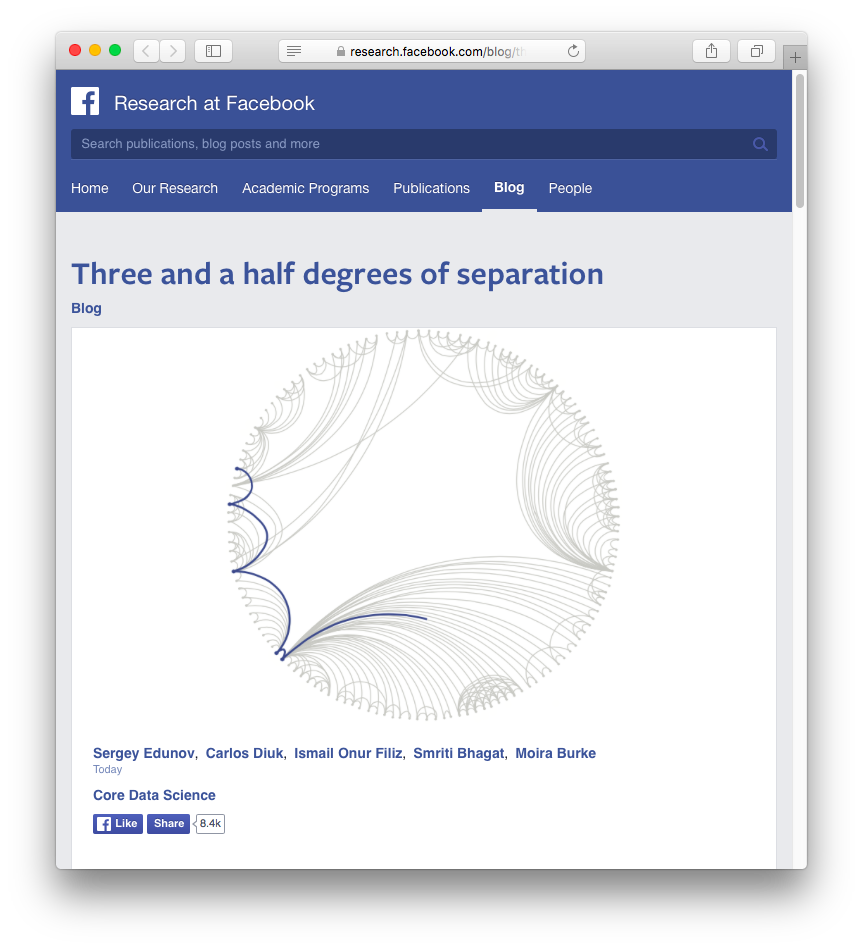Sorry, You’re Probably Not As Connected As Facebook Says You Are

Until Thursday, I had not realized that the 4th of February was now “Friends Day” — but I’m now sure that Facebook will never let me forget the newly-invented holiday that doubles as the anniversary of the social network’s 2004 founding.
To mark the occasion, Facebook did two things.
One was to generate personalized videos based on snippets of your past interactions with pals on Facebook. (Cost-saving FYI: If you’re anxious to get a copy of the song that plays in it, Lemaitre’s “Cut To Black,” it’s 40 cents cheaper at Amazon than at iTunes.) My video and the others I’ve been seen are endearing and heartwarming in a way you might not expect from a cold, unfeeling algorithm.
The other was to release the results of a study into the degrees of separation among Facebook users, It found that, on average, the 1.59 billion people on Facebook are less than four relationships apart from each other. According to the study’s authors (Sergey Edunov, Carlos Diuk, Ismail Onur Filiz, Smriti Bhagat, and Moira Burke), in a post titled “Three and half degrees of separation”:
“Each person in the world (at least among the 1.59 billion people active on Facebook) is connected to every other person by an average of three and a half other people. The average distance we observe is 4.57, corresponding to 3.57 intermediaries or degrees of separation.’ Within the US, people are connected to each other by an average of 3.46 degrees.”
Numbers game
If you read that post while logged in to the service, it will also calculate your own number — mine is 3.24. For good measure, it cites the digits of Facebook founder Mark Zuckerberg (at 3.17, he’s less connected than I might have expected) and chief operating officer Sheryl Sandberg (a chummier 2.92).

Mark Zuckerberg celebrates Friends Day. (Image: Facebook)
I asked friends and colleagues for their own numbers. The lowest figure reported was 2.98, about what I expected for a guy with 2,234 friends; the highest was 3.36, from a fellow with 560 friends. Although people with more Facebook friends tended to have a lower degrees-of-separation number, that wasn’t always the case.
In their post, the Facebook researchers also noted that a 2011 study conducted along similar lines found 3.74 degrees of separation. They wrote approvingly: “Now, with twice as many people using the site, we’ve grown more interconnected, thus shortening the distance between any two people in the world.”
Good work, connected world!
Alas, I suspect that we’re not quite as linked in — sorry! — as those numbers might suggest.
It’s all relative
First off, this study, like others, is stuck with the fact that while not all friendships are of equal value, Facebook’s friend-or-not default options don’t reflect those subtleties.
And while you can promote some friends to the exalted status of “Close friends” and demote others to the status of “Acquaintances,” in my experience many users either don’t know about that option or ignore it.
I suspect that redoing the survey with Facebook acquaintance-level friends valued at a lower level would yield a different result. But if the study did not attempt that (Facebook PR would not say if it did), one part of Facebook does factor in those distinctions: the News Feed algorithm, which shows fewer posts from acquaintances and more from close friends and also continuously revises what you see based on your interactions with your friends.

The Facebook News Feed algorithm knows who really matters to you — or at least it thinks it does. (Image: Facebook)
If you define your functional Facebook relationships in terms of who shows up in your Feed — set aside for the moment how many people use the social network in a read-only mode to keep up with kids and grandkids — your Facebook number will probably increase and the rest of the world will recede.
You could further argue that the three degrees of separation called out in the title of the Facebook researchers’ blog post — friends of friends of friends — is not exactly stable ground on which to build a new relationship on anyway.
Then again, that three-hop threshold was good enough for the National Security Agency: If a target of its surveillance called somebody who called somebody else who called you, you too would be eligible for its scrutiny.
But if Facebook doesn’t actually bring the world that much closer together on any given day, you have to give it credit for this much: The virtual group-hug that is getting birthday greetings from close friends, friends and even acquaintances on the social network is pretty great.
Thinking about that, the real Friends Day on the site isn’t Feb. 4, but the one day a year when your online pals strive and mostly fail to applaud the anniversary of your arrival with something more creative than “Happy birthday!”
Email Rob at rob@robpegoraro.com; follow him on Twitter at @robpegoraro.

